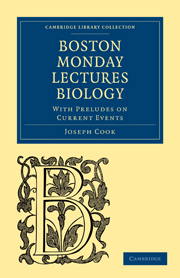Book contents
- Frontmatter
- INTRODUCTION
- Contents
- LECTURES
- I HUXLEY AND TYNDALL ON EVOLUTION
- II THE CONCESSIONS OF EVOLUTIONISTS
- III THE CONCESSIONS OF EVOLUTIONISTS
- IV THE MICROSCOPE AND MATERIALISM
- V LOTZE, BEALE, AND HUXLEY ON LIVING TISSUES
- VI LIFE, OR MECHANISM—WHICH?
- VII DOES DEATH END ALL? INVOLUTION AND EVOLUTION
- VIII DOES DEATH END ALL? THE NERVES AND THE SOUL
- IX DOES DEATH END ALL? INSTINCT IMMORTAL?
- X DOES DEATH END ALL? BAIN'S MATERIALISM
- XI AUTOMATIC AND INFLUENTIAL NERVES
- XII EMERSON'S VIEWS ON IMMORTALITY
- XIII ULRICI ON THE SPIRITUAL BODY
- INDEX
VI - LIFE, OR MECHANISM—WHICH?
Published online by Cambridge University Press: 05 October 2010
- Frontmatter
- INTRODUCTION
- Contents
- LECTURES
- I HUXLEY AND TYNDALL ON EVOLUTION
- II THE CONCESSIONS OF EVOLUTIONISTS
- III THE CONCESSIONS OF EVOLUTIONISTS
- IV THE MICROSCOPE AND MATERIALISM
- V LOTZE, BEALE, AND HUXLEY ON LIVING TISSUES
- VI LIFE, OR MECHANISM—WHICH?
- VII DOES DEATH END ALL? INVOLUTION AND EVOLUTION
- VIII DOES DEATH END ALL? THE NERVES AND THE SOUL
- IX DOES DEATH END ALL? INSTINCT IMMORTAL?
- X DOES DEATH END ALL? BAIN'S MATERIALISM
- XI AUTOMATIC AND INFLUENTIAL NERVES
- XII EMERSON'S VIEWS ON IMMORTALITY
- XIII ULRICI ON THE SPIRITUAL BODY
- INDEX
Summary
“Tu cuncta superno
Ducis ab exemplo, pulchrum pulcherimus ipse
Mundum mente gerens, similique imagine formans.”
Boethius, De Consol., 9.“What time this world's great workmaister did cast
To make all things such as we now behold,
It seems that He before His eyes had plast
A goodly patterne, to whose perfect mould
He fashioned them as comely as He could,
That now so fair and seemly they appear;
As naught may be amended anywhere.
That wondrous patterne, wheresoe'er it be,
Whether in Earth, laid up in secret store,
Or else in Heaven, that no man may it see
With sinful eyes, for fear it to deflore,
Is perfect beauty.”
—Spenser.One day the poet Goethe, when in his advanced age, was riding home to Weimar with his friend Eckermann, and conversing on the immortality of the soul. They turned by Tiefurt into the Weimar road, and stopped at a spot, where, like other travellers, I have often meditated on Goethe's career; and they had from that outlook a majestic view of the setting sun. The great poet and philosopher remained for many minutes in perfect silence, and at last said with mystic but tremorless emphasis, “Untergehend sogar ist's immer dieselbige Sonne. Setting, nevertheless the sun is always the same sun. I am fully convinced that our spirit is a being of a nature quite indestructible, and that its activity continues from eternity to eternity.”
- Type
- Chapter
- Information
- BiologyWith Preludes on Current Events, pp. 57 - 63Publisher: Cambridge University PressPrint publication year: 2009First published in: 1879



